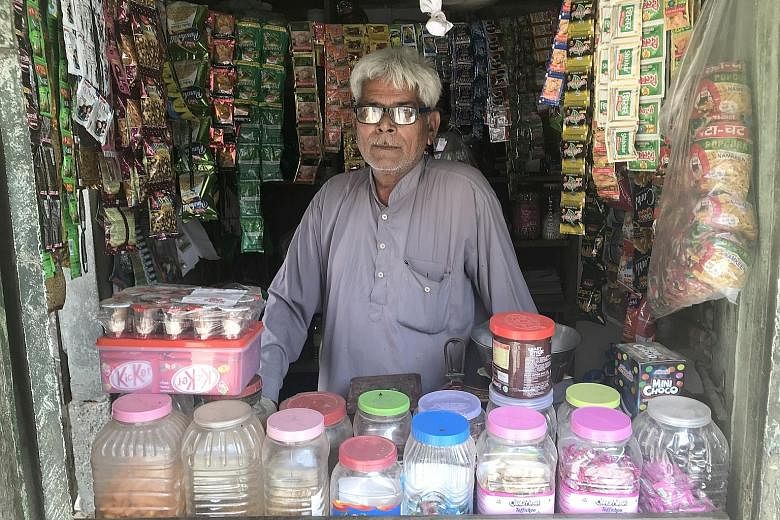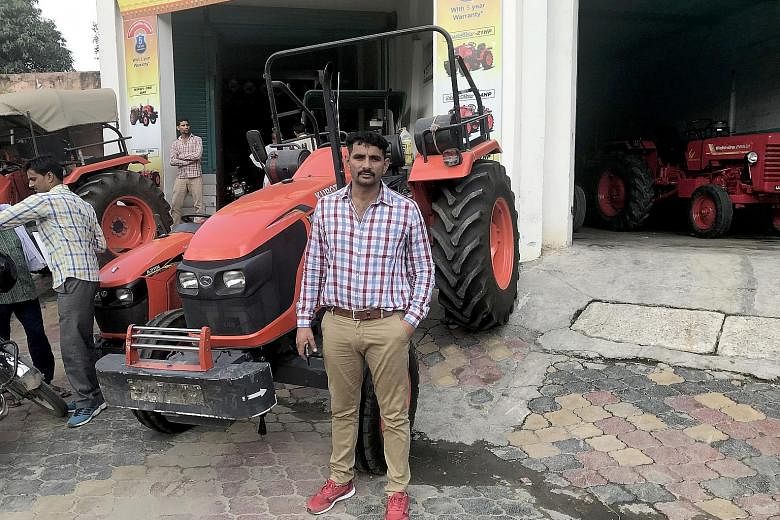UTTAR PRADESH • The falling sales of biscuits and other household staples are a pointer to how consumption in India is declining, triggering a slowdown.
The country, which lost its title as the world's fastest-growing economy to China early this year, has seen its growth rate fall to 5 per cent - the lowest in over six years - in the April-to-June quarter of the financial year.
The falling sales are most apparent in rural parts of the country.
In Sikhaida Hajari village in Uttar Pradesh, shopkeeper Moolchand said he used to earn 1,000 rupees (S$19.60) daily from the sale of items such as toothpaste, biscuits, sweets, snacks, batteries and oil.
Over the past two years, he said, his average daily sales have fallen by half. The best-selling item in his hole-in-the-wall shop is shampoo, sold in sachets for one rupee each.
"I sell less of everything now, whether it's cooking oil or biscuits. People want to buy a biscuit packet for not more than five rupees. It's very difficult," he said.
Falling consumption is seen to be triggering an economic slowdown in India.
According to market research firm Nielson, the economy's weakness is driven by the slowdown in household spending, which forms nearly two-thirds of India's gross domestic product.
Nielsen data shows that rural consumption is slowing at double the rate of urban areas, with "slowdown across all food as well as non-food categories, (including) salty snacks, biscuits, spices, toilet soaps and packaged teas" in the quarter ended June 30.
India's demonetisation of high-value currency notes in 2016, resulting in 85 per cent of the cash being taken out of circulation, had a big impact on the rural areas, which operate on cash.
Farmers, already in debt, were thrown into deeper crisis, while daily-wage labourers who usually move from the village to cities for work were left unemployed.
Mr Sunil Khiani, retail measurement services lead at Nielsen South Asia, said: "The rural slowdown is largely attributed to macro-economic indicators such as a slowdown in rural output, reduced government spending and also, untimely rains that impacted crops in markets in north India."
In an e-mail response to queries from The Straits Times, he noted that things could change in the next couple of months.
"The rainfall this year has been better than expected and the government has announced different measures. India is also on the cusp of the festive season. With these factors in place, there is an expectation of an upturn in the industry in the next few months," he added.
The government has taken a series of measures, including increasing public spending on infrastructure and cutting corporate tax, to stimulate the economy.
Consumer firms are also feeling the pinch from the slowing economy, although some have adapted to the changing conditions.
Mr Lalit Malik, chief financial officer of ayurvedic and natural healthcare company Dabur India, told The Straits Times: "The pace of growth is restricted. When there is overall pressure on industry (due to the economic slowdown), there is some implication on company."
But he said Dabur's strategy to introduce smaller, lower-priced products has helped it to expand its reach in rural India.
"The idea is to reach out to a larger number of people. We have been gradually doing it (introducing the products.) We have to put more focus on low-unit packs," Mr Malik said.
"The short-term pain will continue. Things are not going to get better overnight. A lot will depend on how soon fiscal stimulus kicks in and purchasing power increases."
The slowdown, according to Nielsen, is more apparent in four states including Uttar Pradesh, India's most populous state with a population of over 200 million.
Mr Manu Raghuvanshi runs a tractor showroom that supplies tractors to western Uttar Pradesh.
Sales have fallen by 25 per cent from last year. "The farmers don't have purchasing power. They come and see the tractors, but they stop short of buying," said Mr Raghuvanshi, as he stands beside his bright red Japanese-made tractors.
In the city of Shamli, where sugar cane farming has brought prosperity, the slowdown has been compounded by late payments from sugar cane mills.
Farmers are due four months' worth of payments, ranging from 70,000 rupees and upward, from the mills.
Farmer Rajnish Kumar, who has 9ha of land on which he farms sugar cane and cabbage, said that apart from the late payments by the sugar cane mills, sugar cane prices have also remained the same over the past two years, even as input costs have gone up.
Sugar cane is selling at 325 rupees per quintal, which is equivalent to 100kg. But pesticide prices have gone up 40 per cent and fertiliser prices have risen by 30 per cent.
Mr Kumar said: "I have cut down on buying all non-essential items. The last time I bought biscuits was over 21/2 months ago, and that was because we had guests over."
Next door, housewife Babita Saini has been tightening the household budget every month.
"We used to buy 5kg to 10kg of sugar at a time. Now we buy only 1kg. Same with dal, we used to buy 5kg to 10kg. Now we buy 1kg," said Ms Saini, whose household has six people.
"We put a little bit of dal and lots of water. So we can stretch that 1kg for two months at least."
Her husband Surinder said: "When the price of airline fuel goes up, the price of the airline ticket goes up, but the farmer has nothing."



